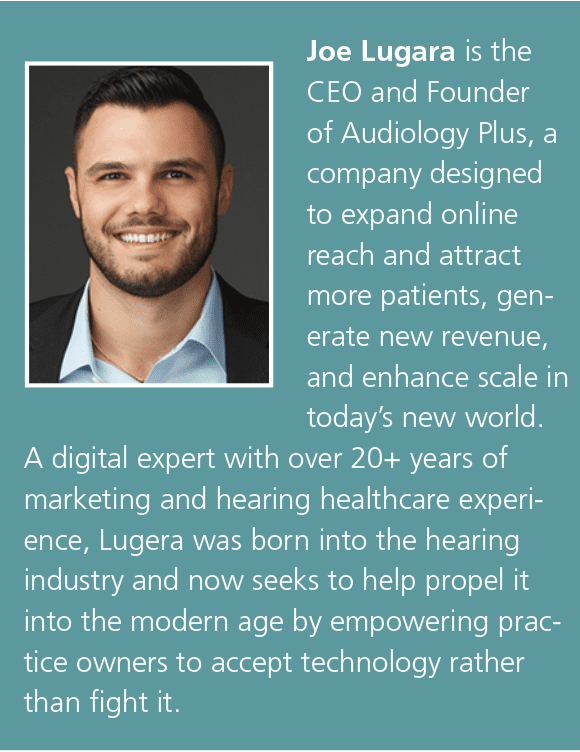Practice Management | August 2021 Hearing Review
By Joe Lugara
Big box retailers are now a fixture in the hearing healthcare market. Although it may be more difficult to beat them on price, there are many other ways private-practice hearing care professionals are outcompeting these dispensing Goliaths.
Big box retailers like Costco or Sam’s Club are some of the largest retailers of hearing aids in the world, making them a very prominent competitor for hearing healthcare professionals. While their presence in the hearing aid industry may be many things, their impact on the market should not be ignored or denied.
Big box retailers are a major competitor for one reason: money. These retailers can provide hearing aids at an incredibly reduced price. But this doesn’t have to be a negative thing! It is important to understand the role they play so you know how to position your services to compete.
First, let’s review some important points. Some good reasons for people to go to big box retailers include:
- They do sell hearing aids at a great price.
- Not everyone can afford the level of care hearing professionals provide, so the big box retailer can be helpful for those who just don’t have the funds.
- They have a lot of outlets and distribution power and often rely on their reputation to deliver products of value.
- These retailers have done a good job of providing solid options.1
Some good reasons for people to NOT go to the retail route include:
- Retailers can tend to lean toward what is best for their bottom line versus the patient’s needs.2
- Retailers are great at providing the device, but have been known to struggle with hearing aid programming,3 particularly in harder-to-fit patients or for those with more complex needs, causing people to explore other options.
- Some brands they sell can only be programmed in-store (they sell “locked” hearing aids, which limits a person’s access to care). This means the consumer always needs to be close to the retailer if they have any programming issue with their hearing aids, because not just any hearing care professional can work on these locked hearing aids. Another provider could clean and change domes, etc, but they generaly cannot make any fitting/programming adjustments.
So, if you have a patient who has a minor hearing loss and a tight budget, they may be a good fit for the big box retailer option. But while these stores are great as a warehouse club, it is constantly debated within the hearing healthcare industry whether it is a good idea to entrust them with matters of hearing health. After all, hearing loss is a healthcare issue and can take time to monitor and can require long-term management. On the other hand, medicine in general is turning toward more economical patient-driven do-it-yourself (DIY) and over-the-counter (OTC) options with which the hearing industry is now well familiar.
Given the above, the one main factor that make people choose the big box retailer or mass merchandiser is the price, and unfortunately the discounts offered there are extremely difficult or impossible to replicate in smaller private practices.
Hearing Healthcare Professionals Offer A Lot Of Value
You can focus on other things besides price, including:
1) One-on-one support for specific individualized hearing care and healthcare. Big box retailers have become more versatile (eg, eye centers with quick-purchase eyeglasses available), but it is worth pointing out that matters of healthcare sometimes require more specialized attention.4 With a person’s eyes, they can undergo an eye exam and get a specific prescription to correct their vision impairment if their condition is relatively straightforward; the same can go for a person with a basic form of hearing loss.
However, in most cases, an individual requires a more holistic approach to treatment and healthcare. It is so important to look at the person as a whole and not assume that their condition is easy to pigeonhole into one treatment. Needs assessments and careful attention and collaboration with patients for achieving their listening goals (eg, via functional communication assessments like COSI, PACA, etc) are processes to which few mass merchandisers are dedicated.5-7
A lot of hearing care professionals take their relationships with their patients personally; they want to ensure their patients succeed and experience the best possible outcome. If someone decides to purchase their hearing aid(s) through a local practice, most hearing practitioners will schedule regular follow ups and include these visits, including verification and validation measures, in their price. Hearing professionals are also becoming more accessible through virtual options like telehealth and e-commerce so patients can continue to get this one-on-one support at home.
2) Generous demo programs. Hearing care professionals deliver a “try before you buy” approach. Not only are hearing aids an expensive commitment, but they are also a lifestyle adaptation, and a hearing practice can focus on aural rehab. Someone may think they know exactly what they want, but then after wearing the hearing aid for awhile could change their mind. A private practice can clearly individualize and detail their AR program so patients can return their hearing aid if they change their mind (within a certain time-frame). A retailer may allow returns past the state mandated 30-45 days, but patients need to ask the specific store they are considering using.
3) Some hearing practices are associated with ENTs, with more services available besides just hearing aid purchases. Again, not all hearing-related conditions are “basic” or easy to treat. Problems like tinnitus management and inner-ear conditions can’t usually be addressed at a retail dispensing office. Hearing practices look at the person as a whole, and their approach to hearing loss and related ear conditions is more holistic.
4) Big box retailers don’t offer the latest and greatest models and features. Big box retailers have done a good job of getting solid options at a lower price point, but traditionally without all the premium features.8
5) Offer financing options. It’s no secret that hearing aids represent a substantial financial commitment. Many hearing care practices offer financing options and if you are one of them, that can be an important factor when a patient is making their decision. A lot of times, people will be willing to pay more if they are getting what they want. Maybe the basic hearing aid from the retail store isn’t what they truly want, but you offer a payment plan or a financing option that makes what they want more financially attainable. That can make all the difference.
6) Unbundle your services. Unbundling your services could make you more competitive. You can carry a low-cost hearing aid in office and utilize options like YouTube to support patients. You can create your own informational and how-to videos that are easily accessible online. Plus, videos also boost your credibility online—you will get more SEO and traffic with videos! A growing percentage of practices now carry a “big box killer” device in the $800-1,000 range (some are even experimenting with OTC-like aids that come with limited professional services and/or trade-in provisions later for a standard hearing aid).
You can also show them the difference between the low cost option and the upgrades.
Big Box Retailers Don’t Have To Be Demonized
If you need a quick response for patients who ask or bring up the cheaper option, we have an easy, go-to response you can use:
“I love shopping at that store, too. They are the best place to get many products like toilet paper, peanut butter, tires, and more. Yes, they sell hearing aids, but here at [insert your business name], we focus on your individual needs, backed up with extensive education and best practices, so we deliver patient-centered hearing healthcare and unique solutions for our local community.”
It is important to not just dismiss the competition or try to belittle their business to try to elevate yours. Big box stores aren’t going away and most of us are coming to a grudging conclusion that they have their place in our market. Therefore, you can recognize them as an option but you are certainly the better option when it comes to intricate hearing healthcare needs. This moment gives you an opportunity to highlight your experience, versatility, personalized care, and expertise.
At the end of the day, some people find what they need at a big box retailer and their experience is good, but for others that is not the case. Just like with private practices, it all comes down to the local provider and the specific needs of a patient.
If someone is adamant about using the more affordable option, the only thing you can or should do is let them know what you offer, allow them to make their own decisions, and let them know you are there if they have any questions or need anything. They may be back in your practice or refer someone else to you.
References
- Copithorne D. Costco Hearing Aids-Models, Features, Prices, and Reviews. Hearing Tracker website. https://www.hearingtracker.com/hearing-aids/costco. Published June 25, 2021.
- Dr Cliff, AuD new Costco Kirkland Signature 10.0 hearing aid & my cycling accident [vlog]! YouTube. Published April 4, 2021. https://youtu.be/wSEFVOMcal4.
- Dr Cliff, AuD, Why I still LOVE that Costco sells hearing aids [vlog]. YouTube. Published June 2, 2020. https://www.youtube.com/watch?v=UfphJlyDmE8.
- Kochkin S, Beck DL, Christensen LA, et al. MarkeTrak VIII: The impact of the hearing healthcare professional on hearing aid user success. Hearing Review. 2010;17(4):12-34.
- Taylor B, Manchaiah V, Clutterbuck S. Using the Personal Assessment of Communication Abilities (PACA) Tool. Hearing Review. 2016;23(3):20-26.
- Clark JG. How to differentiate your patient care with 5 best practices. Hearing Review. 2020;27(9):12-16.
- Sweetow RW. Instead of a hearing aid evaluation, let’s assess functional communication ability. Hear Jour. 2007;60(9):26-31.
- Strom K. Are Costco hearing aids any good? Hearing Review Consumer. https://consumer.hearingreview.com/are-costco-hearing-aids-any-good/.

Correspondence to Joe Lugara at: [email protected].
Citation for this article: Lugara J. How private practices in hearing care can compete with big box retailers. Hearing Review. 2021;28(8):32-33.





